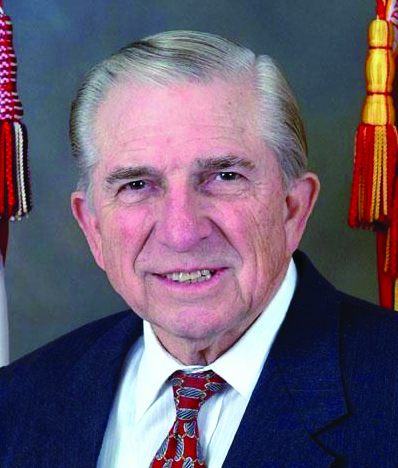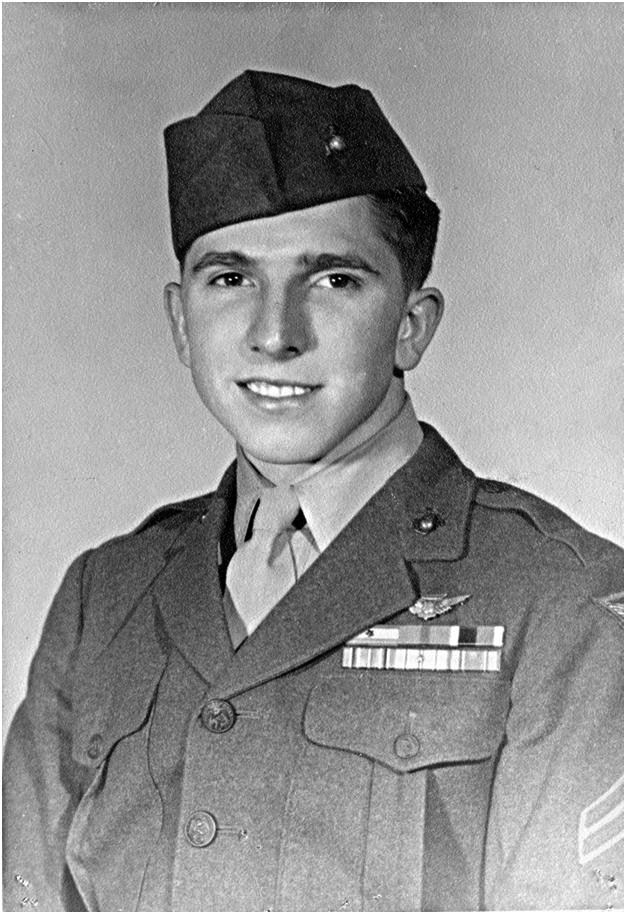By Jeff Brumley
By all accounts there are few people like Bruce Heilman.
Friends and family say he’s a hard-charging 86-year-old, working still as chancellor of the University of Richmond, a passionate husband, father and grandfather, active in Baptist life and serving as the spokesman for a national veterans organization.
 Plus he continues to astonish old and young alike by riding around Richmond, Virginia, and the United States on his beloved Harley-Davidson.
Plus he continues to astonish old and young alike by riding around Richmond, Virginia, and the United States on his beloved Harley-Davidson.
Where friends and family differ is in explaining how this Depression-era high school dropout and Marine combat veteran does all this and more, and with an enthusiasm that’s contagious and inspiring.
“I think he enjoys making an impact and making a difference,” said Terry Heilman Sylvester, one of Heilman’s six children.
Randy Ashcraft, pastor in residence at the Virginia Baptist Mission Board, said it’s Heilman’s energy.
“He has a vision that carries life beyond what’s right in front of you,” Ashcraft said. “I had a mid-50s pastor say ‘he is my new hero.’”
Another says it’s simply Heilman’s manner.
“It’s his personality,” said Westleigh Roberts, vice president of programs for The Greatest Generations Foundation, the organization Heilman serves as national spokesman. “He’s extremely eloquent, very outspoken at what he does.”
Conservative Baptist upbringing
Heilman offers no easy, simple explanation. Rather, his life is the sum total of experiences that began on a rural Kentucky farm during the Great Depression and meandered through World War II and subsequent decades raising a family, getting an education and helping thousands of others go to school.
“I learned a lot of discipline and I learned the truth,” he said. “My father would starve to pay a bill.”
Faith was central to that discipline. His father was a farmer and licensed minister who invited preachers to dinner most Sunday nights. They were very conservative theologically and Heilman recalled the measure of a good Christian was in abstinence from certain behaviors.
“You didn’t smoke but you raised tobacco, and you didn’t drink but we sent all our corn to Virginia” to be used in manufacturing alcohol, Heilman said.
Faith evolves in Marines, combat
But it was in the military where Heilman said his faith began to develop – and it started right away.
 On the troop train taking him to California for Marine Corps basic training, Heilman was disturbed by fellow recruits playing craps and cursing.
On the troop train taking him to California for Marine Corps basic training, Heilman was disturbed by fellow recruits playing craps and cursing.
“I was almost sorry I was leaving home,” he said.
But he wasn’t sorry for the strength his faith gave him to witness some of the most brutal killing of the war in places like Iwo Jima and Okinawa.
“They say there are no atheists in foxholes, well there were some,” he said. “If the wounded weren’t calling on their mothers, they were calling on their faith.”
Heilman often called on his faith, too. It helped him get through an assignment, shortly after the war ended, as the radio operator for commanders touring a defeated Japan.
“I was at Hiroshima and Nagasaki walking through those ashes,” he said. “No one mentioned radioactivity and we just kicked it around like dust.”
Meeting Americans of different races and religions pushed Heilman toward a moderate Baptist faith. So did having a Marine friend who was very aggressive in his witnessing.
“I learned there is a fine line between where you can live your life and where you insist others live it just like you do.”
‘Constant drive to better himself’
Heilman served another two years after the war and used his GI Bill money to attend Campbellsville University, the only school he found that let him attend without a high school diploma.
Soon he discovered a knack for academics and interest in providing education to others, and so began years of master’s and doctoral studies and teaching and then a career in higher education administration.
He worked at a number of schools in different positions, including president of Meredith College in Raleigh, N.C., before taking the presidency of the University of Richmond in 1966.
By then he had acquired a reputation as a premier fundraiser.
By the time he retired as president in 1986, Heilman had boosted the university’s endowment by $200 million — moving it from $8 million when he arrived toward the $1.8 billion it is today.
“I concentrated on fundraising because the university was almost out of business” when he arrived.
But his daughter said it was more than that. He raised six kids and had a hand in helping with 11 grandchildren – all while going to school and then holding down demanding jobs.
“He was someone who flunked out of high school, but he had a constant drive to better himself,” she said.
‘Raised us like Marines’
The values and discipline, self-improvement and humility were passed right along to his children, Sylvester said.
“He kind of raised us like Marines,” she said. “We were taught to serve the poor, and that every single person in this world is an equal.”
But he also modeled how to have fun while serving others, she said.
That got a boost when Betty bought her husband a new Harley Road King for his 71st birthday to make up for the decades he went without riding to concentrate on his career and family. He immediately hopped on and rode it to San Diego.
He has since traded that one in and said he plans to get a new bike again when he turns 91.
“I can’t think of anything better than putting that Harley on cruise control at 70 mph and the wind in my face,” he said.
A calling to help veterans
It was through his riding that Heilman discovered another calling in life: connecting with World War II veterans during his cross-country rides.
That’s how he got on the radar of The Greatest Generations Foundation, Roberts said. The organization sends veterans on trips to visit the battlefields where they fought decades before. Heilman had been on such a trip to Iwo Jima and Okinawa in 2010.
Roberts said the group started hearing from veterans who said Heilman would make a great spokesman, especially given his long-distance motorcycle riding and outgoing personality. His 9,000-mile ride on behalf of the organization this summer generated a lot of publicity and new contacts for the organization, Roberts said.
“Whether you’ve known him for five minutes or five years, you feel like you’re a great friend of his,” Roberts said.
‘Adding to the adventure’
Heilman’s also been helping spread the gospel through his riding, and changing stereotypes about motorcyclists.
Ashcroft, a rider himself, is the organizer of the annual Thunder in the Hills Christian motorcycle rallies. Heilman was one of two guest speakers at the 2011 event and so impressed riders they want him back as honorary chairman for life.
“We asked him to speak and he hit a home run,” Ashcroft said.
Plus his reputation as a rider is unquestioned. On July 16, the day he turned 86, Heilman completed his 9,000 trek that took him through 34 states in 25 days.
“He created an energy and enthusiasm because of his all-out commitment to his life’s work,” Ashcroft said. “He is what we need to be about in our lives.”
Heilman said he plans to keep on going as a promoter of the University of Richmond, veterans, his faith and church (First Baptist, Richmond) and his motorcycle quests.
“I think of Helen Keller who said that life is either a grand adventure or it’s nothing,” Heilman said. “We all need to be doing something that adds to that adventure.”
